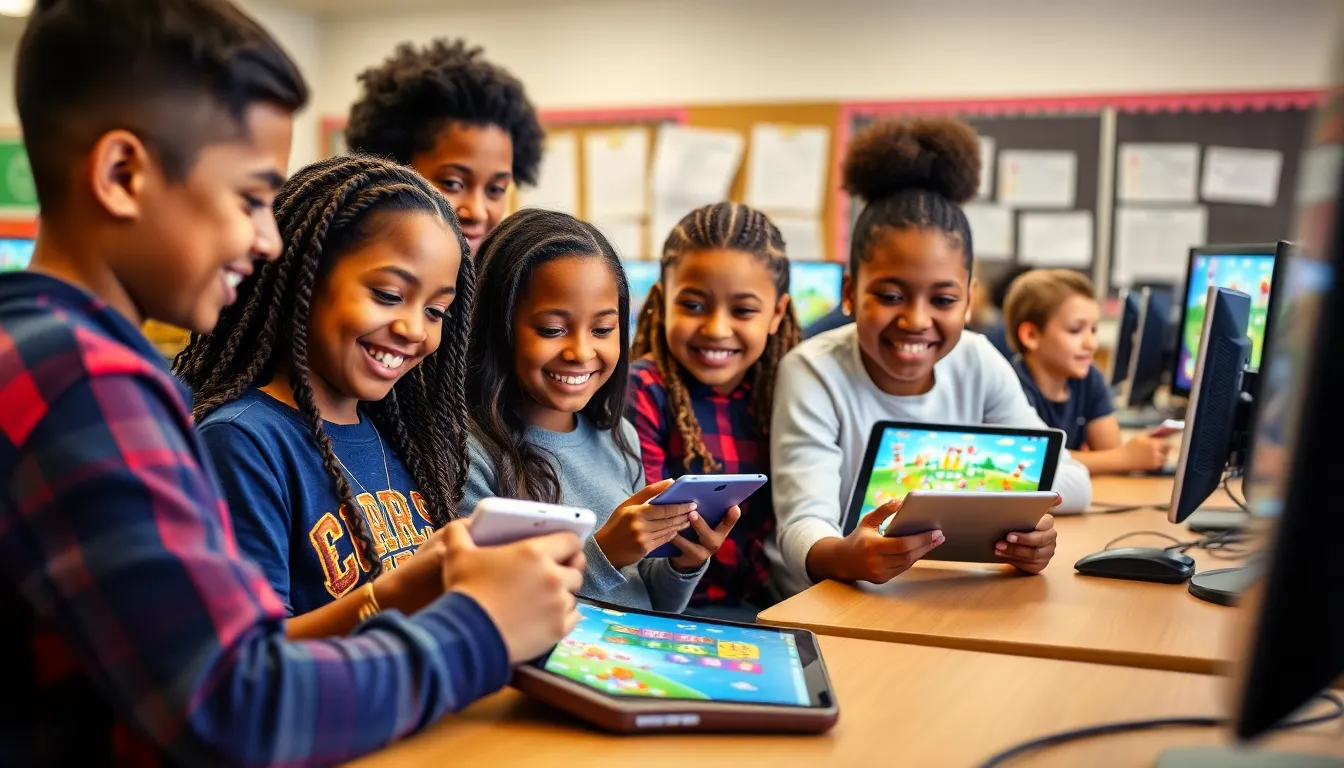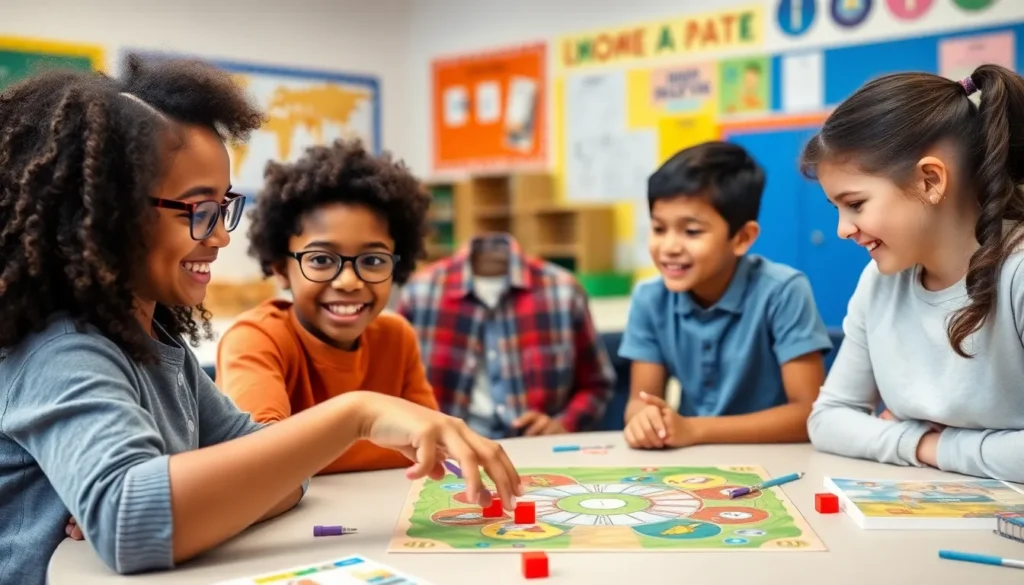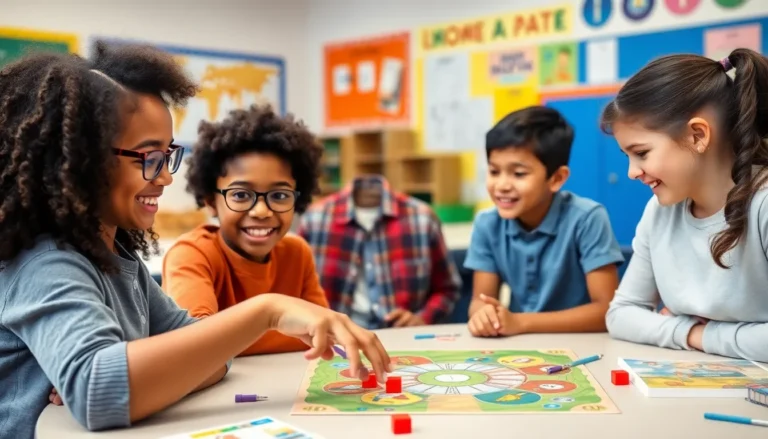In a world where textbooks can feel as exciting as watching paint dry, games for learning are shaking things up. Imagine trading in dull lectures for thrilling quests and engaging challenges that make education feel like playtime. It’s not just about fun; it’s about harnessing the power of play to boost retention and spark creativity.
Table of Contents
ToggleOverview of Games for Learning
Games for learning create immersive environments that stimulate engagement. These interactive platforms enable learners to absorb information more effectively compared to traditional methods. Studies indicate that participants in game-based learning environments retain up to 90% of information, significantly higher than those relying on lectures.
Educational games span various subjects, from math to science. Game mechanics often encourage critical thinking and problem-solving skills. Players navigate challenges that require strategic planning and quick decision-making. Research shows these experiences can improve cognitive skills by promoting active learning.
Platforms also cater to diverse learning styles. Visual learners benefit from graphics and animations, while auditory learners engage with sound elements. Kinesthetic learners thrive in environments that require movement or physical interaction. All these factors contribute to a well-rounded educational experience.
Moreover, many games allow for collaboration. Group activities in educational games foster teamwork and communication. Players learn to share ideas and strategies, which builds social skills alongside academic knowledge.
Incorporating rewards and achievements adds an element of motivation. Badges, points, or levels provide learners with goals to strive for, encouraging persistence. This gamification leads to a more enjoyable learning process that keeps students invested in their education.
Overall, games for learning represent a progressive shift in education. Their designs not only make learning enjoyable but also significantly enhance information retention and creativity.
Benefits of Using Games in Education

Games in education enhance the learning experience by promoting engagement and skill development. Their interactive nature captivates learners and encourages exploration.
Engagement and Motivation
Engaging learners through games holds their attention much more effectively than traditional methods. Games foster a sense of competition, driving students to improve their performance. Through challenges and rewards, they boost motivation and ignite a desire to learn. Active participation leads to deeper connections with the material, making it memorable. Research shows that individuals in game-based environments retain up to 90% of the information compared to 20% with lectures. Environments that spark curiosity result in increased classroom participation and enjoyment. Ultimately, educational games create a vibrant atmosphere, transforming learning into an adventure.
Skill Development
Skill development occurs naturally through game-based learning. Participants refine critical thinking, problem-solving, and strategic planning abilities while interacting with educational content. Games that require quick decision-making enhance cognitive skills and adaptability. Different formats support multiple learning styles, ensuring that visual, auditory, and kinesthetic learners can thrive. Collaboration within games improves teamwork and communication, essential skills in today’s workforce. Practical experiences in simulated environments contribute to real-world applications, more than conventional methods offer. Overall, educational games present an effective platform for nurturing diverse skills essential for future success.
Types of Games for Learning
Various game formats enhance learning experiences. Each type serves unique educational purposes and engages different learning styles.
Video Games
Video games foster immersive learning environments. They provide real-time feedback, encouraging players to adapt strategies quickly. Often, video games emphasize critical thinking and problem-solving by presenting challenges requiring strategic planning. Research indicates players retain up to 90% of information acquired during gameplay, significantly surpassing traditional lecture-based retention rates. Engaging narratives and appealing graphics further stimulate learners, maintaining their interest and motivation.
Board Games
Board games promote face-to-face interaction, fostering collaboration. Players engage in joint problem-solving and develop social skills through cooperative strategies. These games often introduce complex rules, enhancing strategic thinking and critical analysis. Busy teams can simulate real-world scenarios, making abstract concepts more tangible. Educational board games cover various subjects like math, geography, and language arts, making learning enjoyable and interactive while facilitating deeper cognitive connections.
Role-Playing Games
Role-playing games (RPGs) immerse players in fictional scenarios, promoting creativity and exploration. Participants assume characters, leading to enhanced empathy and perspective-taking. RPGs encourage open-ended decision-making, which develops critical thinking skills. Collaborative storytelling in RPGs helps strengthen teamwork, as players work together to overcome obstacles. This interactive approach cultivates a sense of commitment to learning, driving players to invest time and effort into understanding complex themes and narratives.
Implementing Games in the Classroom
Incorporating games into the classroom enhances the learning experience significantly. Educators benefit from following specific strategies for successful implementation.
Tips for Educators
Utilize diverse game formats to cater to different learning styles. Set clear objectives that align with curriculum goals to provide direction. Encourage collaboration by creating team-based activities that foster interaction. Utilize technology to access various educational games, enhancing engagement. Regularly review and adjust game content based on student feedback to improve effectiveness.
Measuring Effectiveness
Assessing the impact of games on learning involves various measurement techniques. Observation provides insight into student engagement and participation levels during gameplay. Collecting pre- and post-game assessments offers quantitative data on knowledge retention. Use student feedback to gauge enjoyment and motivation, which directly relate to success. Tracking improvements in critical thinking skills can highlight the effectiveness of game-based learning strategies.
Challenges and Considerations
Game-based learning offers numerous benefits, yet challenges exist that educators must address.
Accessibility Issues
Accessibility remains a significant concern in game-based education. Many students face barriers, such as disabilities or lack of technology access, hindering their participation. Adapting games to accommodate diverse learner needs is crucial. For instance, incorporating screen readers for visually impaired students enhances inclusivity. Furthermore, ensuring that games run on various devices can help mitigate technology disparities. Educators should also seek out games designed with accessibility features, promoting equal opportunities for all students to engage in the learning process.
Balancing Fun and Learning
Finding the right balance between fun and educational value is essential. Engaging games may sometimes prioritize entertainment over learning objectives. Teachers need to select games with clear educational goals integrated into gameplay. For example, educational games that focus on specific skills, like math or language, while maintaining a fun atmosphere can foster deeper learning. Assessing the learning outcomes of chosen games ensures that enjoyment does not overshadow educational intent. By deliberately aligning game content with curriculum objectives, educators create an effective and enjoyable learning experience.
Games for learning offer a revolutionary approach to education that captivates and engages students in ways traditional methods often can’t. By fostering a sense of competition and collaboration, these interactive experiences not only enhance knowledge retention but also develop crucial skills like critical thinking and teamwork.
As educators increasingly integrate game-based learning into their classrooms, they’re finding that the benefits extend beyond mere enjoyment. The adaptability of educational games allows them to cater to various learning styles while addressing accessibility challenges. This progressive shift in educational practices not only makes learning more enjoyable but also prepares students for future success in an ever-evolving world. Embracing games as a learning tool is not just a trend; it’s a vital step toward a more effective and engaging educational landscape.



